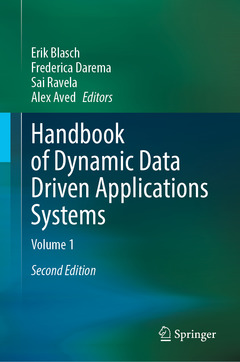Description
Handbook of Dynamic Data Driven Applications Systems (2nd Ed., 2nd ed. 2022)
Volume 1
Coordinators: Blasch Erik P., Darema Frederica, Ravela Sai, Aved Alex J.
Language: English
Subject for Handbook of Dynamic Data Driven Applications Systems:
Publication date: 05-2023
766 p. · 15.5x23.5 cm · Paperback
Publication date: 05-2022
766 p. · 15.5x23.5 cm · Hardback
Description
/li>Contents
/li>Biography
/li>Comment
/li>
The Handbook of Dynamic Data Driven Applications Systems establishes an authoritative reference of DDDAS, pioneered by Dr. Darema and the co-authors for researchers and practitioners developing DDDAS technologies.
Beginning with general concepts and history of the paradigm, the text provides 32 chapters by leading experts in ten application areas to enable an accurate understanding, analysis, and control of complex systems; be they natural, engineered, or societal:
The authors explain how DDDAS unifies the computational and instrumentation aspects of an application system, extends the notion of Smart Computing to span from the high-end to the real-time data acquisition and control, and manages Big Data exploitation with high-dimensional model coordination.
The Dynamically Data Driven Applications Systems (DDDAS) paradigm inspired research regarding the prediction of severe storms. Specifically, the DDDAS concept allows atmospheric observing systems, computer forecast models, and cyberinfrastructure to dynamically configure themselves in optimal ways in direct response to current or anticipated weather conditions. In so doing, all resources are used in an optimal manner to maximize the quality and timeliness of information they provide.
Kelvin Droegemeier, Regents? Professor of Meteorology at the University of Oklahoma; former Director of the White House Office of Science and Technology Policy
We may well be entering the golden age of data science, as society in general has come to appreciate the possibilities for organizational strategies that harness massive streams of data. The challenges and opportunities are even greater when the data or the underlying system are dynamic - and DDDAS is the time-tested paradigm for realizing this potential.
Sangtae Kim, Distinguished Professor of Mechanical Engineering and Distinguished Professor of Chemical Engineering at Purdue University
Erik P. Blasch is a program officer with the Air Force Office of Scientific Research. His focus areas are in multi-domain (space, air, ground) data fusion, target tracking, pattern recognition, and robotics. He has authored 750+ scientific papers, 22 patents, 30 tutorials, and 5 books. His recognitions include the Military Sensing Society Mignogna Leadership in Data Fusion Award, IEEE Aerospace and Electronics Systems Society Mimno Best Magazine Paper Award, and IEEE Russ Bioengineering Award. He was also a founding member of the International Society of Information Fusion (ISIF). His previous appointments include adjunct associate professor at Wright State University, exchange scientist at Defense Research and Development Canada, and officer in the Air Force Research Laboratory. Dr. Blasch is an associate fellow of American Institute of Aeronautics and Astronautics (AIAA), fellow of the Society of Photo-Optical and Instrumentation Engineers (SPIE) and fellow of the Institute of Electrical and Electronics Engineers (IEEE).
Dr. Frederica Darema: retired as Senior Executive Service (SES) member and Director of the Air Force Office of Scientific Research, in Arlington, Virginia, where she led the entire basic research investment for the AF and served as Research Director in the Air Force’s Chief Data Office, and as Associate Deputy Assistant Secretary the Air Force Office for Science, Technology and Engineering. Prior career history includes: research staff positions at the University of Pittsburgh, Brookhaven National Laboratory, and Schlumberger-Doll; and management and executive-level positions at: the T.J.Watson IBM Research Center and the IBM Corporate Strategy Group; the National Science Foundation and the Defense Advanced Research Projects Agency; and Director of the AFOSR Directorate for Information, Math, and Life Sciences. Dr. Darema, PhD in Nuclear Physics, is a Fellow of the Institute of Electrical and Electronics Engineers (IEEE), among oth
Peer-reviewed contributions that focus on the use of DDDAS for various applications into one volume
Contributions from leading experts in various domains to reflect individual applications to the more general paradigm
Identification of contemporary concepts using DDDAS such as UAVs, surveillance, and computing

